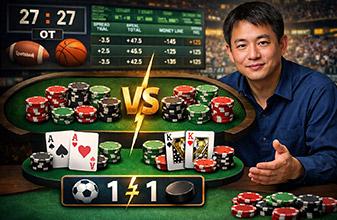Place Bets and Buy Bets

Casino games tournaments are fun, and they can be profitable too. In upcoming articles, we will continue to publish a series of excerpts from Stanford Wong’s book, Casino Tournament Strategy.
Place Bets
You place a number in craps by setting chips on a neutral place on the table and telling the dealer what you want. You can place the 6 or 8 by putting up $6 to win $7. That is, if you place the 6 for $6 you lose that bet if a 7 rolls but if a 6 rolls you win $7.
On place bets on 6 and 8, the house advantage is 1.5%. The average place bet on 6 or 8 is decided in 3.273 rolls, making the effective casino edge 0.46%. Thus place bets on 6 and 8 are only slightly more costly than pass and don’t pass bets.
You can place the 5 or 9 by putting up $5 to win $7. The house edge on those bets is 4%.
In some casinos you can place the 4 and 10, putting up $5 to win $9. The casino edge on those bets is 6.7%. Some casinos do not allow place bets on 4 and 10. Place bets have the advantage of complete flexibility. You can put them up or remove them at will.
Buy Bets
You can buy a number by giving the casino a 5% commission on the payoff. For example, you can buy the 4 by giving the dealer $100 to win $200, and tossing in another $5 for the commission. If you win you are ahead $195, and if you lose you are out $105.
Buying the 4 and 10 has a lower casino edge (5%) than placing them, and that is why people who want to bet the 4 or 10 buy the number instead of placing it. Some casinos take a 5% commission only on winning buy bets of 4 and 10, which cuts the casino edge to 1.7%.
Some casinos allow both buy and place bets on every number. You buy the 5 or 9 by giving the dealer $100 to win $150 and also giving the dealer $5 commission. You buy the 6 or 8 by giving the dealer $100 to win $120 and also giving the dealer $5 commission.
Most common is to allow either buy bets or place bets but not both. Therefore, if you want to bet on 4 and 10 you do it with buy bets, and if you want to bet on 5, 6, 8, or 9, you place them. If both place and buy bets are allowed on all the numbers, you must know to say “both place and buy” where it says just “place” or just “buy.”
Buy bets, like place bets, have complete flexibility. You can put them up or take them down at will. If you take down a buy bet, the commission is returned to you.
How to Make Place and Buy Bets
There is an established procedure for making place bets and buy bets. First, set your chips on the felt in a place where they cannot be construed as being a bet. For example, you may set them down straddling a line. Second, tell the dealer what to do with your chips. The dealer will reach for the chips while listening to your explanation of how you want to bet them. You will have action on your bets even if the dealer does not get your chips arranged properly on the layout before the dice roll.
It is important to do this right in a tournament. You want to control when and how much you bet; if you end up with a bet different from what you want, that is your fault and not the dealer’s.
Removing Place and Buy Bets
To remove your place and buy bets, ask the dealer to take your bets “down.” The dealer will pick up your chips and set them on the felt in front of you. Frequently a customer will remove only one or a few place bets and leave the others working; so if you want to remove all of yours, watch to be sure the dealer gets them all. If one or two of your bets accidentally are not removed, they have action when the dice roll.
You also can ask that your bets be “off,” which means they stay on the layout but have no action on the next roll. The dealer will place a small disk on the top of each bet that is off. You can take bets off for one roll or for roll after roll until you ask that they be “on.”
The difference between bets down and bets off is when you take the bets down you put the chips in the rack, and when your bets are off the chips stay on the layout.
This article is part of a series, to be continued…
Excerpted with permission from Casino Tournament Strategy by Stanford Wong, edited for this format.











Please log in or register to leave a comment